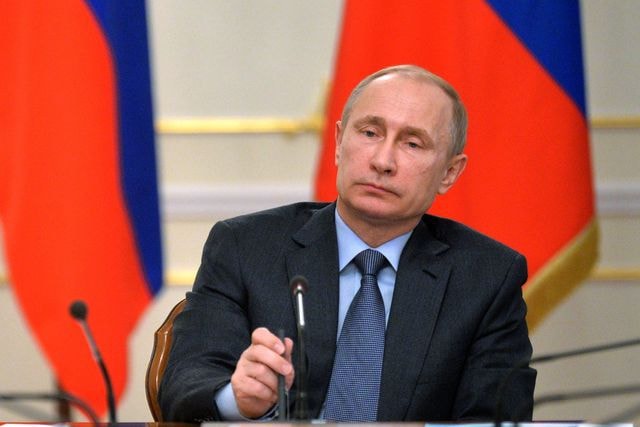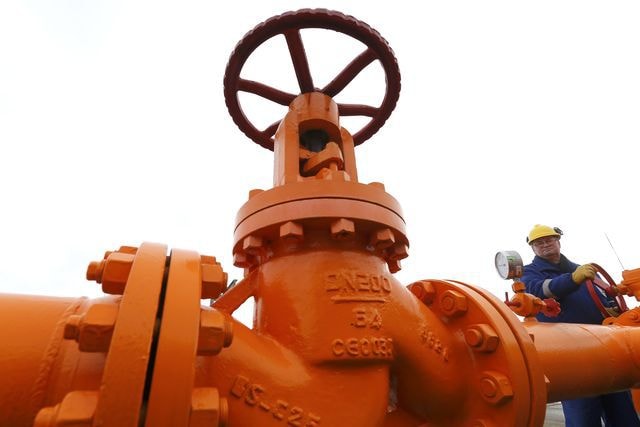Russia and Europe: Is the balance off?
(Baonghean) - On Thursday, February 26, Russian President Vladimir Putin received President of the French Senate Gerard Larcher - who has the "mission" to call on Russia, Ukraine, France and Germany to respect the terms of the Minsk agreement signed on February 12.
The aim is to convince Kiev to accept constitutional reform, recognizing a certain autonomy in the eastern region controlled by the separatists. This means acknowledging Russian influence in the region, but at the same time rejecting the possibility of "federalization" of the country - something Russia advocates.
However, that goal is still quite far away. For now, France and Germany are actively influencing the parties to maintain the Minsk agreement. Next Thursday, Gerard Larcher will go to Germany to discuss with his counterpart to speed up the negotiation process and resolve the Ukraine crisis.
 |
| Russian President Putin. |
The situation in the Donbass war zone is calming down: both sides have begun to withdraw heavy weapons, but no formal agreement on autonomy has been reached. Concerns remain over the port city of Mariupol, and Gerard Larcher has said: "Any move towards Mariupol means crossing the red line, breaking the Minsk agreements." However, he also said that Russia has not yet responded to this.
Other sensitive issues such as the presence of the Organization for Security and Cooperation in Europe on Ukrainian territory or the gas contract between Ukraine and Russia have also not reached any concrete conclusions. Especially when Russia threatens to stop gas deliveries to Ukraine.
On Wednesday, February 25, Russian President Vladimir Putin accused the Kiev government of refusing to supply gas to the eastern region of a “genocidal intention.” After all, supplying gas to this region of 4 million people was also part of the contract signed between Naftogaz and Gazprom in October 2014.
Under the agreement, Ukraine must pay in advance for the gas it plans to consume. If payment is not made on time, Gazprom will have the right to close the gas pipeline valves again, as it has done before.
In fact, Russia began reducing gas deliveries to Ukraine to less than half the amount requested by Ukraine on Sunday and Monday, after Ukraine announced it would not pay for gas consumed in the east. The Kiev government argued that this was because it did not have accurate control over the amount of gas Russia was supplying and the demand in the region.
The Brussels Commission has not yet made a final decision because the information it has collected is "conflicting". However, a meeting between the three parties will take place soon, because Europe is extremely interested in the energy issue related to Russia. Because, every year, Europe buys 125 billion cubic meters of gas from Russia and 50% of this gas is transited through Ukraine. This has a significant impact on the projects of the European Energy Union, when the bloc, although still promoting the role of Russia, is also intending to turn to other partners such as Norway, Azerbaijan, Turkmenistan, and even Iran. Perhaps this is also the reason why Russia wants to put pressure on Europe through Ukraine.
 |
| Gazprom gas pipeline in Europe. |
Russia appears to be in control of the game. Military exercises on the borders of Estonia and Latvia on Wednesday, February 25, could not help but worry Europe. The exercises, which lasted until Saturday, February 28, involved 500 military vehicles and 1,500 paratroopers, and reinforced NATO’s concerns that Russia could seize territory belonging to member states.
Since the beginning of the Ukraine crisis, Baltic states such as Latvia and Estonia have accused Russia of military intervention and expressed concern that they would suffer the same fate. Lithuania alone announced on Tuesday, February 24, that it would introduce mandatory military service in the country, citing the “tense geopolitical context.” With such a series of moves at the same time, Russia is putting pressure on Europe from many sides.
The situation in Russia and Europe is clearly changing, gradually moving away from the temporary "balanced" position, the tug of war between the two sides to tilt the balance in favor of Russia. However, it is still too early to declare victory for the birch country, because it should be remembered that Russia is not without weaknesses - with an economy that has just escaped the bottom of the crisis, and that the US has not really jumped into the game.
Le Thuc Anh(According to Le Monde)






